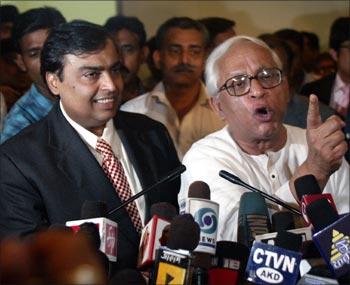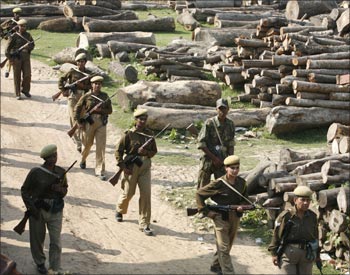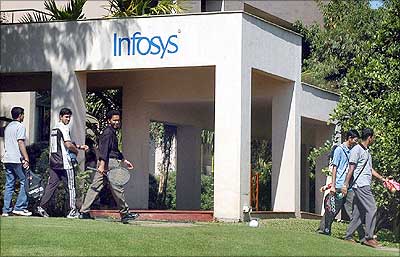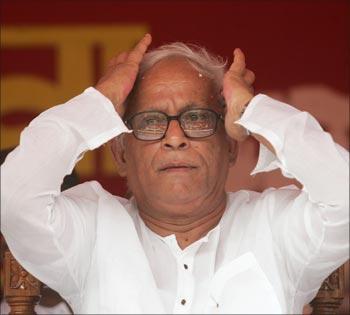Photographs: Jayanta Shaw/Reuters Rediff Business Desk
Do trade and investments in West Bengal have a bleak future? Have appalling rise in Maoist insurgency, incessant strikes and political disturbance severely told upon the state's economy?
Those who harbour such notions need a rethink.
For, a recent study conducted by the Associated Chambers of Commerce and Industry of India indicates that the state's business confidence index is at a more-than-satisfactory 6.5 on a scale of 10.
This sends out a clear signal that India Inc still has a lot of faith left in West Bengal's economic and industrial stance.
"The policies are working in the right direction to make Bengal's industrial prospects conducive," Assocham secretary general D S Rawat said.
Click NEXT to know more about the Assocham study vis-a-vis the optimism expressed by India Inc about West Bengal . . .
Bengal's economy has a bleak future? No way!
Image: Paramilitary soldiers patrol Nandigram village, about 170 km (105 miles) southwest of Kolkata.Photographs: Parth Sanyal/Reuters
The Assocham conducted the study among 280 chief executive officers and managing directors.
According to the study, over 225 respondents opined that the state can be rated on par with favourite investment destinations like Gujarat, Maharashtra, Karnataka, Andhra Pradesh, Rajasthan and Himachal Pradesh.
Over 200 CEOs observe that apart from domestic investment, Bengal can attract investment from overseas players in clean energy, biotech and nanotechnology, healthcare, education and infrastructure.
As per the Assocham estimates, Bengal received investments up to Rs 5.3 lakh crore (Rs 5.3 trillion) till September 2009 over a 12-year period.
. . .
Bengal's economy has a bleak future? No way!
Image: Infosys Mysore campus.Photographs: Stringer/Reuters
What has been the Bengal's USP?
- 70% of the respondents feel that the state owes its high business confidence index to its 9% gross domestic product growth rate in the last 6 years;
- 64% of the respondents are happy with the development of IT and ITEs in Bengal;
- 52% feel that the state's benefits lie in its cheap and skilled manpower and low cost of living;
- 190 of the CEOs are for setting up an investment promotion cell in the state;
- 55% want more opportunities in agriculture, food processing, chemicals, petroleum and downstream industries, iron and steel and power.
In the first five years of his tenure, Bengal Chief Minister Buddhadev Bhattacharjee focussed on the IT sector. He got Wipro and hoped for Infosys, while TCS expanded.
In fact, Wipro boss Azim Premji thought he was the best chief minister.
There were quite a few other success stories as well. JSW Steel's 10 million tonne steel project is probably the only mega steel project to have the land, mines and all clearances, including special economic zone status.
Bhattacharjee also recently stepped in to allocate land to Wipro and Infosys. Both the companies were earlier offered land at an IT township called Kolkata Links located near a spa resort called Vedic Village which erupted in controversy, involving the state government as well.
Why did the Bengal chief minister woo the IT sector? The idea was that IT firms primarily hired white collar employees who are not given to unionism.
Since there is no dearth of highly skilled manpower in the state, given its tradition of stressing on the importance of education, finding the right people has been easy for the IT companies
. . .
Bengal's economy has a bleak future? No way!
Image: The amphitheatre at the Infosys campus in Mysore.Photographs: Rediff Archives
Investments in Bengal: Recent rays of hope
According to a recent report in The Economic Times, Adhunik Corporation, which is planning to set up an integrated steel plant in West Bengal, has been provided 505 acres at Raghunathpur in Purulia district.
- Adhunik Corporation's project involves setting up a steel plant with a capacity of 1.1 million tonnes per annum (tpa) along with a 1,000 mw captive power plant and a 1 million cement plant at Raghunathpur.
- Infosys Technologies plans to set up special economic zone in West Bengal. The West Bengal government has recently pledged 50 acres of land to Infosys in New Town on the northeastern fringes of Kolkata.
In Kolkata, Infosys had planned to invest Rs 500 crore (Rs 5 billion) to set up a development centre in 2004, housing 5,000 people.
The project got delayed and in June 2009 an IT township project in Salt Lake, Kolkata was scrapped by the West Bengal government following a controversy.
However, in September the state government offered 45 acres each to Infosys and Wipro to set up development centres.
- India's state-owned Garden Reach Shipbuilders & Engineers, Kolkata, is to double its capacity in the next 12 months at a cost of $87 million.
- Demand for space in the newly constructed high-on-amenity office buildings in Kolkata is on the rise. This is because companies, located in the age-old buildings in core business districts now prefer to set up new facilities in buildings having high levels of safety infrastructure.
. . .
Bengal's economy has a bleak future? No way!
Image: Buddhadeb Bhattacharjee, chief minister of West Bengal.Photographs: Jayanta Shaw/Reuters
Realty market too looks upbeat
A recent CRISIL research city realty report provided comprehensive information and analysis of more than 400 areas across 88 micro markets in 10 cities, including Kolkata.
Sudhir Nair, head, CRISIL research, said, "Accelerated growth of Indian economy, recovery of global economy, improved liquidity and expected fall in interest rates are key factors that will signal demand revival in the residential segment.
"This segment is likely to see a much faster revival due to strong underlying demand for housing and supply coming at attractive price points."
"Demand in the commercial and retail segment is likely to remain under stress for the next two years owing to excess supply and weak offtake."
. . .
Bengal's economy has a bleak future? No way!
Image: West Bengal Commerce and Industry Minister Nirupam Sen.Photographs: Rediff Archives
Why Bengal is being termed a land of opportunities?
Of late, investments have started flowing into the state, businesses have taken off and economic condition of the state has registered signs of improvement.
Some of the key factors that brought in these changes are:
- Over the past 10 years, West Bengal's real estate market has undergone an astonishing transformation. The changes represent great challenges and unprecedented opportunities. Kolkata's intrepid skyline says it all.
- Siliguri, gateway to the North East is driven by four 'T's. Tea, timber, tourism and transport are attracting investments.
- Asansol, heart of the coal belt, is once again attracting investors to the region.
- In the steel city of Durgapur, there is considerable expansion of townships and other facilities.
- Bardhaman looks quite bright in terms of development.
- The rapid expansion of business activity in the state as a whole is boosting demand for built space as well as built-to-suit offices.
- West Bengal arguably has one of the most aggressive incentive packages for IT / ITES companies and developers alike, including subsidised land, exemption from stamp duty and property tax.
- Kolkata is a high priority destination for international retailers because of its large population and disposable income.
- The entry of many reputed hotel groups in recent years has been in response to the expanding business activities in the state.
- There is a strong residential demand, as shown by the absorption patterns of recent residential projects, which are expected to grow in tandem with economic activity and investor interest.
- A unique and innovative public-private partnership model that has been put in place by the West Bengal government is helping the residential sector to grow at a fast pace.
- Because of the state's high literacy rate, Bengal offers corporates with a well equipped work force.
- Moreover, land in Bengal is more easily available at lower costs when compared to other metros such as Mumbai and Delhi.
- Kolkata is a net exporter of electricity, which reduces the operating costs in the city.







article